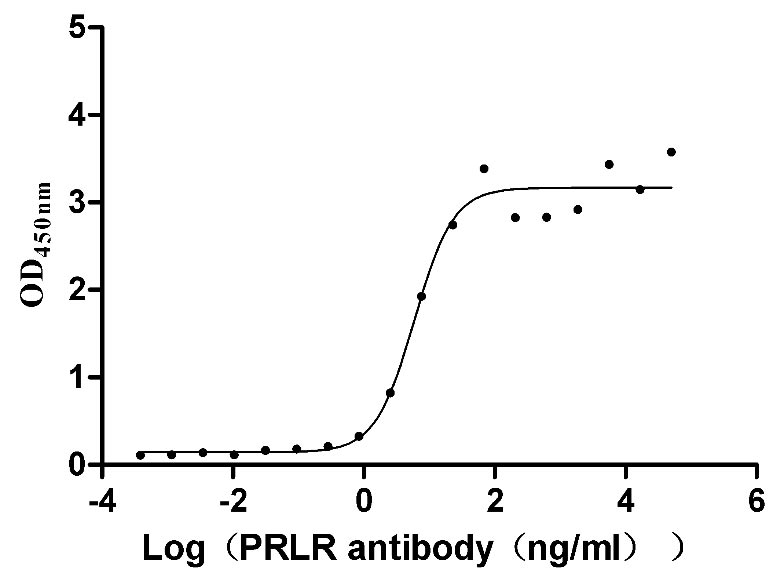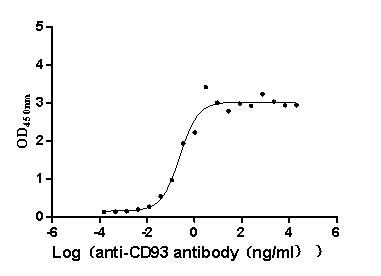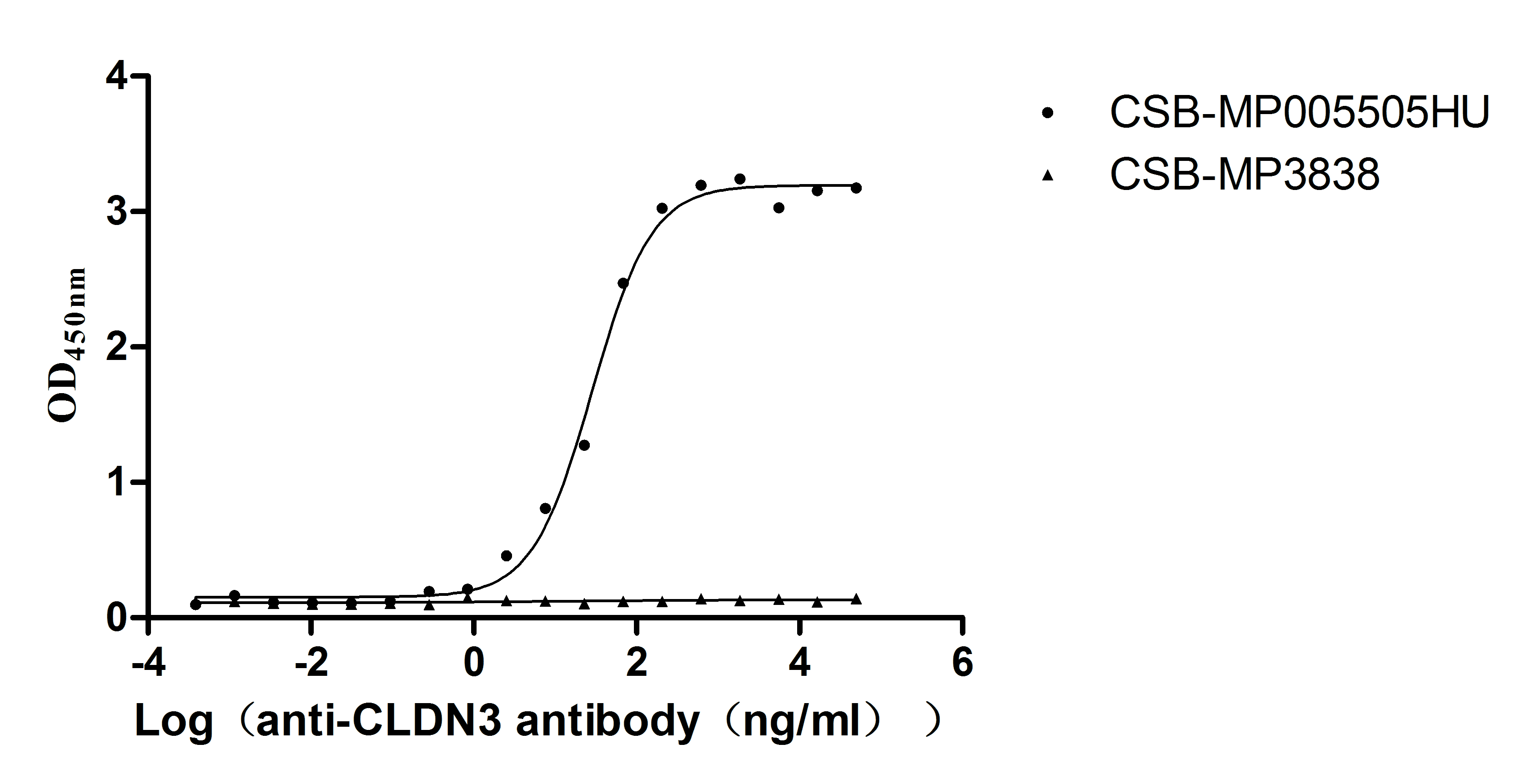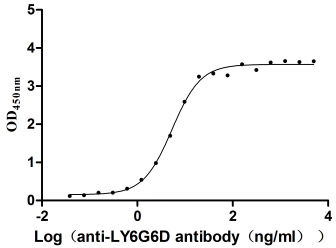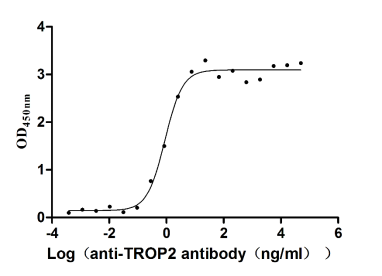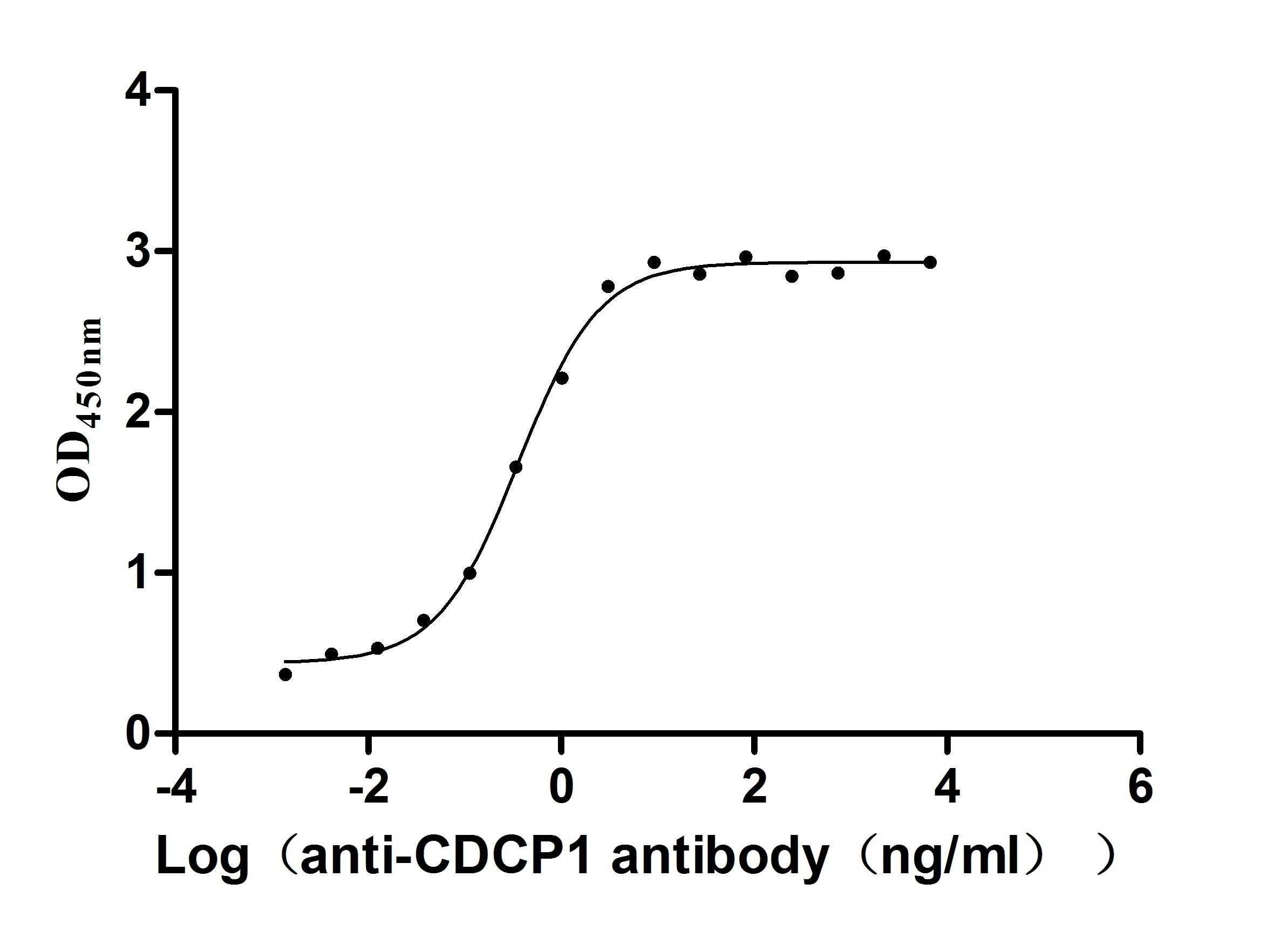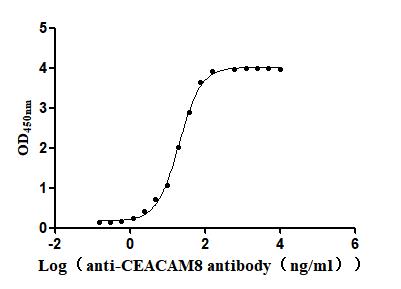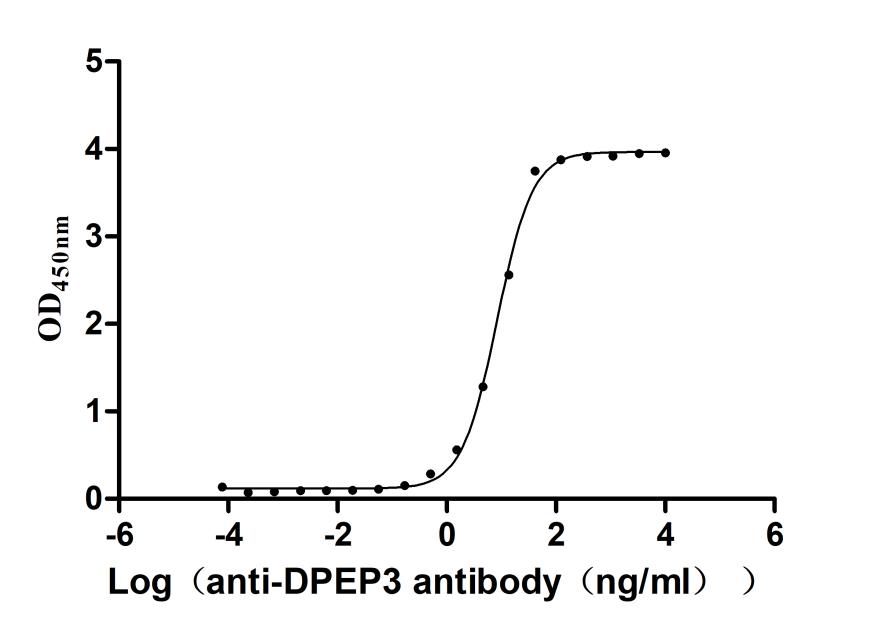Recombinant Human C-C chemokine receptor type 8 (CCR8), partial
-
中文名称:Recombinant Human C-C chemokine receptor type 8(CCR8),partial,Yeast
-
货号:CSB-YP004847HU1
-
规格:
-
来源:Yeast
-
其他:
-
中文名称:Recombinant Human C-C chemokine receptor type 8(CCR8),partial,Yeast
-
货号:CSB-EP004847HU1
-
规格:
-
来源:E.coli
-
其他:
-
中文名称:Recombinant Human C-C chemokine receptor type 8(CCR8),partial,Yeast
-
货号:CSB-EP004847HU1-B
-
规格:
-
来源:E.coli
-
共轭:Avi-tag Biotinylated
E. coli biotin ligase (BirA) is highly specific in covalently attaching biotin to the 15 amino acid AviTag peptide. This recombinant protein was biotinylated in vivo by AviTag-BirA technology, which method is BriA catalyzes amide linkage between the biotin and the specific lysine of the AviTag.
-
其他:
-
中文名称:Recombinant Human C-C chemokine receptor type 8(CCR8),partial,Yeast
-
货号:CSB-BP004847HU1
-
规格:
-
来源:Baculovirus
-
其他:
-
中文名称:Recombinant Human C-C chemokine receptor type 8(CCR8),partial,Yeast
-
货号:CSB-MP004847HU1
-
规格:
-
来源:Mammalian cell
-
其他:
产品详情
-
纯度:>85% (SDS-PAGE)
-
基因名:
-
Uniprot No.:
-
别名:CCR8; CKRL1; CMKBR8; CMKBRL2; C-C chemokine receptor type 8; C-C CKR-8; CC-CKR-8; CCR-8; CC chemokine receptor CHEMR1; Chemokine receptor-like 1; CKR-L1; GPR-CY6; GPRCY6; TER1; CD antigen CDw198
-
种属:Homo sapiens (Human)
-
蛋白长度:Partial
-
蛋白标签:Tag type will be determined during the manufacturing process.
The tag type will be determined during production process. If you have specified tag type, please tell us and we will develop the specified tag preferentially. -
产品提供形式:Lyophilized powder
Note: We will preferentially ship the format that we have in stock, however, if you have any special requirement for the format, please remark your requirement when placing the order, we will prepare according to your demand. -
复溶:We recommend that this vial be briefly centrifuged prior to opening to bring the contents to the bottom. Please reconstitute protein in deionized sterile water to a concentration of 0.1-1.0 mg/mL.We recommend to add 5-50% of glycerol (final concentration) and aliquot for long-term storage at -20℃/-80℃. Our default final concentration of glycerol is 50%. Customers could use it as reference.
-
储存条件:Store at -20°C/-80°C upon receipt, aliquoting is necessary for mutiple use. Avoid repeated freeze-thaw cycles.
-
保质期:The shelf life is related to many factors, storage state, buffer ingredients, storage temperature and the stability of the protein itself.
Generally, the shelf life of liquid form is 6 months at -20°C/-80°C. The shelf life of lyophilized form is 12 months at -20°C/-80°C. -
货期:Delivery time may differ from different purchasing way or location, please kindly consult your local distributors for specific delivery time.Note: All of our proteins are default shipped with normal blue ice packs, if you request to ship with dry ice, please communicate with us in advance and extra fees will be charged.
-
注意事项:Repeated freezing and thawing is not recommended. Store working aliquots at 4°C for up to one week.
-
Datasheet :Please contact us to get it.
相关产品
靶点详情
-
功能:Receptor for the chemokine CCL1/SCYA1/I-309. May regulate monocyte chemotaxis and thymic cell line apoptosis. Alternative coreceptor with CD4 for HIV-1 infection.
-
基因功能参考文献:
- s demonstrate the pivotal role of CCR8(+) Treg cells in restraining immunity and highlight the potential clinical implications of this discovery. PMID: 28533380
- Role of Conserved Disulfide Bridges and Aromatic Residues in Extracellular Loop 2 of Chemokine Receptor CCR8 for Chemokine and Small Molecule Binding. PMID: 27226537
- High CCR8 expression is associated with high recurrence in kidney cancer. PMID: 26716905
- findings suggest that CCR8 expression in ALCL is more closely related to the presence of DUSP22 rearrangements than to cutaneous involvement and that the function of CCR8 may extend beyond its skin-homing properties in this disease PMID: 25390351
- Epidermal-derived vitamin D3 metabolites and prostaglandins provide an essential cue for the localization of CCR8+ immune surveillance T cells within healthy human skin. PMID: 26002980
- CCL1-CCR8 interaction may play a critical role in lymphocytic recruitment in IgG4-related sclerosing cholangitis and type 1 autoimmune pancreatitis, leading to duct-centred inflammation and obliterative phlebitis. PMID: 23811304
- Identification of human CCR8 as a CCL18 receptor. PMID: 23999500
- CCR8(+) myeloid cell subset is expanded in patients with cancer. PMID: 23363815
- Data show that CCR8 expression by newly activated naive T cells is regulated by skin-specific factor(s) derived primarily from epidermal keratinocytes. PMID: 23043070
- C-terminal clipping of chemokine CCL1/I-309 enhances CCR8-mediated intracellular calcium release and anti-apoptotic activity PMID: 22479563
- The functional data from human macrophages suggest a potential cross talk between the CCR8 and the Toll-like receptor 4 (TLR4) pathways, both of which are present in chronic obstructive pulmonary disease patients. PMID: 21976223
- There may be a role for CCR8 in the recruitment of T cells to the lung in asthmatics. PMID: 20455898
- CCR8 mediates rescue from dexamethasone-induced apoptosis via an ERK-dependent pathway PMID: 12525579
- found in the central nervous system and is associated with phagocytic macrophages PMID: 12547701
- CCR8 genes and surrounding genomic regions these genes are the result of the duplication of an ancestral gene prior to the divergence of teleost fish. PMID: 12551893
- Transfected human CCR8-dependent activation of the RAS/MAPK pathway mediates anti-apoptotic activity of I-309/ CCL1 and vMIP-I. PMID: 12645948
- The induction of CCR8 under conditions associated with vascular smooth muscle cell proliferation and migration raises the possibility that CCR8 may play an important role in vessel wall pathology. PMID: 14576057
- the axis CCL1-CCR8 links adaptive and innate immune functions that play a role in the initiation and amplification of atopic skin inflammation PMID: 15814739
- CCR8 ligands are allotropic, binding to distinct sites within CCR8; the human immune system may have evolved to use CCL7 as a selective antagonist of viral chemokine activity at CCR8 but not those of the host ligand PMID: 17023422
- CCR8 is expressed by a small and heterogeneous population of peripheral blood CD4 memory T cells enriched in T helper type 2 (Th2) effector and T regulatory (Treg) cells. PMID: 17082609
- CCR8-expressing CD4-positive T lymphocytes are preferentially recruited from the periphery into the lungs of asthmatic individuals, driven by elevated CCL1 levels produced almost exclusively by mast cells and basophils. PMID: 17641040
- The combination of 17beta-E(2) with the environmental pollutant TCDD is involved in the pathogenesis of endometriosis via up-regulating the chemokine CCR8-I-309. PMID: 17693327
显示更多
收起更多
-
亚细胞定位:Cell membrane; Multi-pass membrane protein.
-
蛋白家族:G-protein coupled receptor 1 family
-
数据库链接:
HGNC: 1609
OMIM: 601834
KEGG: hsa:1237
STRING: 9606.ENSP00000326432
UniGene: Hs.113222
Most popular with customers
-
Recombinant Mouse Prolactin receptor (Prlr), partial (Active)
Express system: Mammalian cell
Species: Mus musculus (Mouse)
-
Recombinant Macaca fascicularis CD93 molecule (CD93), partial (Active)
Express system: Mammalian cell
Species: Macaca fascicularis (Crab-eating macaque) (Cynomolgus monkey)
-
Recombinant Human Claudin-3 (CLDN3)-VLPs (Active)
Express system: Mammalian cell
Species: Homo sapiens (Human)
-
Recombinant Macaca fascicularis lymphocyte antigen 6 family member G6D (LY6G6D) (Active)
Express system: Yeast
Species: Macaca fascicularis (Crab-eating macaque) (Cynomolgus monkey)
-
Recombinant Human Tumor-associated calcium signal transducer 2 (TACSTD2), partial (Active)
Express system: Mammalian cell
Species: Homo sapiens (Human)
-
Recombinant Human CUB domain-containing protein 1 (CDCP1), partial (Active)
Express system: Mammalian cell
Species: Homo sapiens (Human)
-
Recombinant Human Carcinoembryonic antigen-related cell adhesion molecule 8(CEACAM8) (Active)
Express system: Mammalian cell
Species: Homo sapiens (Human)
-
Recombinant Macaca fascicularis Dipeptidase 3(DPEP3) (Active)
Express system: Mammalian cell
Species: Macaca fascicularis (Crab-eating macaque) (Cynomolgus monkey)


